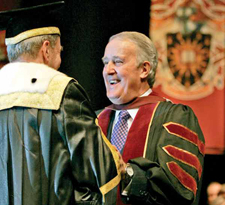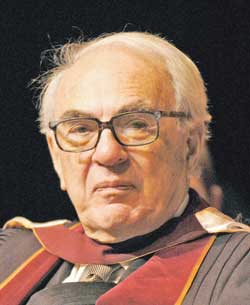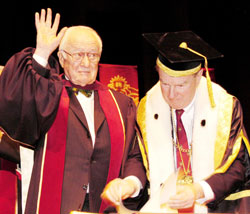Mulroney charms convocation crowd
Former prime minister, diplomat, Telefilm founder receive honorary degrees at Place des Arts

The media turned out to see Brian Mulroney (above, with Chancellor Eric Molson) make his first speech since his illness.
Photo by Corey Narsted
There was less spring in his step, but Brian Mulroney has lost none of his wit.
“I’m glad to be here,” he told the audience at the afternoon convocation ceremony on Dec. 1 with a warm smile. “In fact, I’m glad to be anywhere.”
It had been an unusually tough year for the veteran politician, a year of serious illness and controversy. Graduating students rose in a spontaneous standing ovation to welcome him.
President Claude Lajeunesse introduced Brian Mulroney this way: “Mr. Mulroney’s roots in an Irish-Quebec working-class family have well suited him to a lifetime of negotiation, arbitration, problem-solving and reconciliation: Extremely valuable skills in any society, but particularly in this highly diverse Canada of ours.
“The gifts of oratory and laughter are traditionally associated with Irish culture, and Brian Mulroney has been blessed with both. But he has another trait particular to him, and that is courage.”
In his speech to the students, Mulroney made an impassioned plea for international cooperation. “No nation can solve its difficulties alone, “ he said.
He gave examples of such difficulties: terrorism, the international drug trade, environmental disasters, infant mortality, AIDS and illicit arms.
He added, “We live in a world dominated by one superpower — the U.S., soon to be challenged by another, China. Your generation must provide the leadership to ensure that our national interest remains compatible with the common interest.”
A similar message was delivered at the morning ceremony by diplomat, law professor and art philanthropist Allan Gotlieb.
He was introduced by Political Science professor Peter Stoett, who made reference to Gotlieb’s eight years as ambassador to the U.S., during which the Canadian embassy became a magnet for Washington society.
Gotlieb soberly told the graduating students, “I have seen the traditional order . . . with its great power politics and proliferating ethnic states, demolished by the greatest destructive force in the history of the world, nationalism.”

Allen Gotlieb has taught at Harvard and Oxford
Photo by Luigi D'Astolfo
He continued, “We are now in an uncharted phase of world history. The balance of power is meaningless as a way to maintain international peace. Domestic jurisdiction is no defence against genocide and human rights violations. The boundaries of states, through globalization, have become so porous as to be often invisible.
“International organizations command no military power and are often contaminated by non-elected governments that have no legitimacy. And a new set of actors, private actors, have entered the world scene committed to violence and terror to achieve their goals.”
“I have seen the traditional order demolished by nationalism”
- Allan Gotlieb
He urged graduates to go, like him, into the public service, or at least try to make the world a better place.
Film bureaucrat Michael Spencer was introduced by Dean of Fine Arts Catherine Wild, who quoted actor Donald Sutherland on Spencer’s crucial influence on Canadian filmmaking during the 1960s and ’70s.
Spencer was given $10 million to manage in 1967 when the Canadian Film Development Corporation was established. Now the CFDC is called Telefilm Canada, and domestic film and television are a $3-billion business employing tens of thousands of Canadians.

Michael Spencer waves after signing the oath of office with the help of Chancellor Eric Molson
Photo by Luigi D'Astolfo
In his address, he paid tribute to Concordia’s Mel Hoppenheim School of Cinema, whose roots lie in a course in the early 1970s at Sir George Williams University and in the inspirational work of Loyola College film studies professor Marc Gervais.
Spencer said the School of Cinema now gets 1,100 applications a year, many of them from outside Quebec, and he often meets successful Concordia film graduates. He also said he was touched just to attend the ceremony.
“I have a BA in Law from Oxford University, but mine was a war degree. I have never until now had the pleasure of being present at a convocation to receive a degree in person.”
